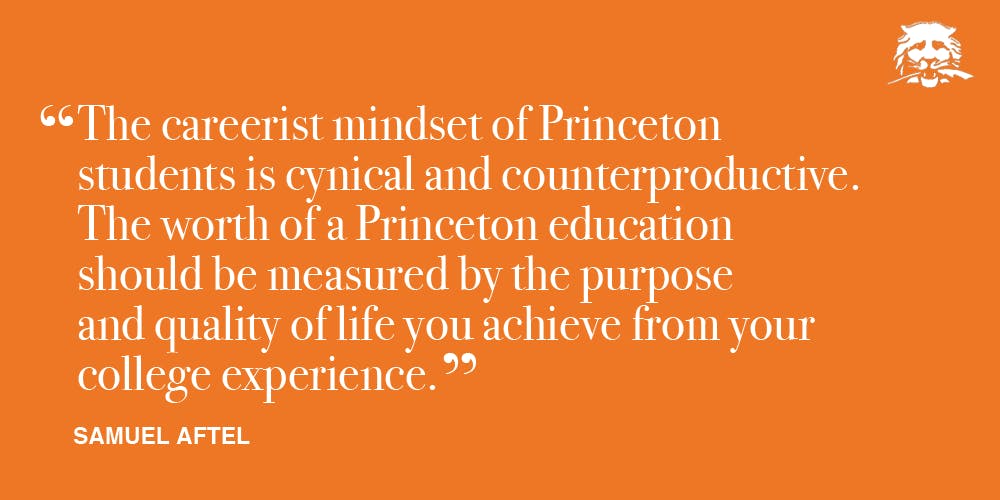April marks the exciting — but also terrifying — time of year when fellow A.B. sophomores must declare their concentration. Some sophomores have known what they want to major in throughout their time at Princeton. But other sophomores have been, and still remain, unsure of what they should declare. Unfortunately, many of these sophomores will halfheartedly select majors based on what they consider to be the safest choice — that is, the discipline that will guarantee them a suitable post-graduation job.
I believe the desperation for a high-paying career, which leads Princeton students to study what is profitable over what is fulfilling, is unhealthy.
Princeton has a well-documented risk-aversion culture. Princetonians often believe they must maximize their hard-won Ivy League degrees for such an education to have any long-term worth. Hence, why major in visual arts — even if it is your passion — when you can guarantee yourself a post-graduation, six-figure salary by majoring in economics?
The careerist mindset of Princeton students is cynical and counterproductive. The worth of a Princeton education should be measured by the purpose and quality of life you achieve from your college experience. That is, the goal of Princeton students should be to study something that can guide them towards a fulfilling life.
Success need not be measured in dollars and cents. Instead, success should be measured by the meaning and purpose of one’s life, including the meaning and purpose of one’s occupation. A teacher who educates and inspires disadvantaged students can experience a tremendous sense of meaning, despite receiving a low salary. Likewise, a Wall Street hedge fund manager who earns five million dollars a year could be miserable due to the job’s demanding hours.
Of course, I am not saying no one should major in lucrative fields like ECO or COS. If a student believes they will be the most fulfilled by working for Goldman Sachs or Google, by all means, they should study economics or computer science and pursue a successful career. But Princeton students are shortchanging themselves existentially if they only major in ECO or COS because these fields often guarantee a prosperous future. Many people in finance or technology find it difficult to obtain a sense of moral purpose from their professions. For example, if you do not love finance, it is very difficult to enjoy working grueling and lonely sixteen-hour days helping to maintain and increase the wealth of billionaires. Where’s the purpose and fulfillment in that?
Similarly, I believe the intellectualism and creativity of Princeton graduates should be harnessed to make a social difference. The amount of income accumulated by Princeton graduates does not impress me. If you use your Princeton education to only achieve financial prosperity, the meaning and intellectual importance of your Princeton education is destroyed. In other words, Princeton graduates have a tremendous opportunity and duty to redistribute the privilege bestowed upon them and the knowledge they have acquired. Working on Wall Street does not necessarily mean you can’t do this. If you believe you can make a positive difference working in finance, you should major in economics and pursue a job in the field. But if you are just majoring in ECO and pursuing a career on Wall Street to make money, your Princeton education could’ve been more meaningfully employed elsewhere.
The notions of purpose and meaning have deeply impacted my experience at Princeton thus far. I recently declared my concentration in history after realizing that I want to (perhaps) pursue a career as a history professor. Although other career paths are tempting, such as those that do not require five to seven years of graduate school or those that pay really well, I always revert back to my love of history, academia, and the opportunity to be a professor.

Sure, as a history professor, if I am lucky enough to obtain a job, I will most likely never make an obscene amount of money, but that’s okay. The actual substance of a career — that is, the intrinsic value of a job — is much more important to me than any extrinsic rewards. By majoring in history and seeking a career as an academic, I will be pursuing my intellectual passion and hopefully making a positive difference in my students’ lives and contributing to my field as a researcher. Money has nothing on that.
Furthermore, the late and profoundly brilliant student writer Marina Keegan, a Yale graduate, penned a 2011 column about Yale students going into finance and consulting. In the piece, published in the Yale Daily News, Keegan lamented the fact that a substantial number of Yale graduates go into finance and consulting without considering a deeper purpose. She wrote, “to me there’s something sad about so many of us entering a line of work in which we’re not (for the most part) producing something, or helping someone, or engaging in something that we’re explicitly passionate about.” Princeton students, too, should consider this wise message.
All in all, majoring in a field that will lead to a lucrative profession is not per se unethical. But so many Princeton graduates too easily sell out to finance, consulting, technology, and other related fields without considering other, more meaningful options.
Life is short. Why not spend it doing something that fulfills you?

Samuel Aftel is a sophomore from East Northport, N.Y. He can be reached at saftel@princeton.edu.








